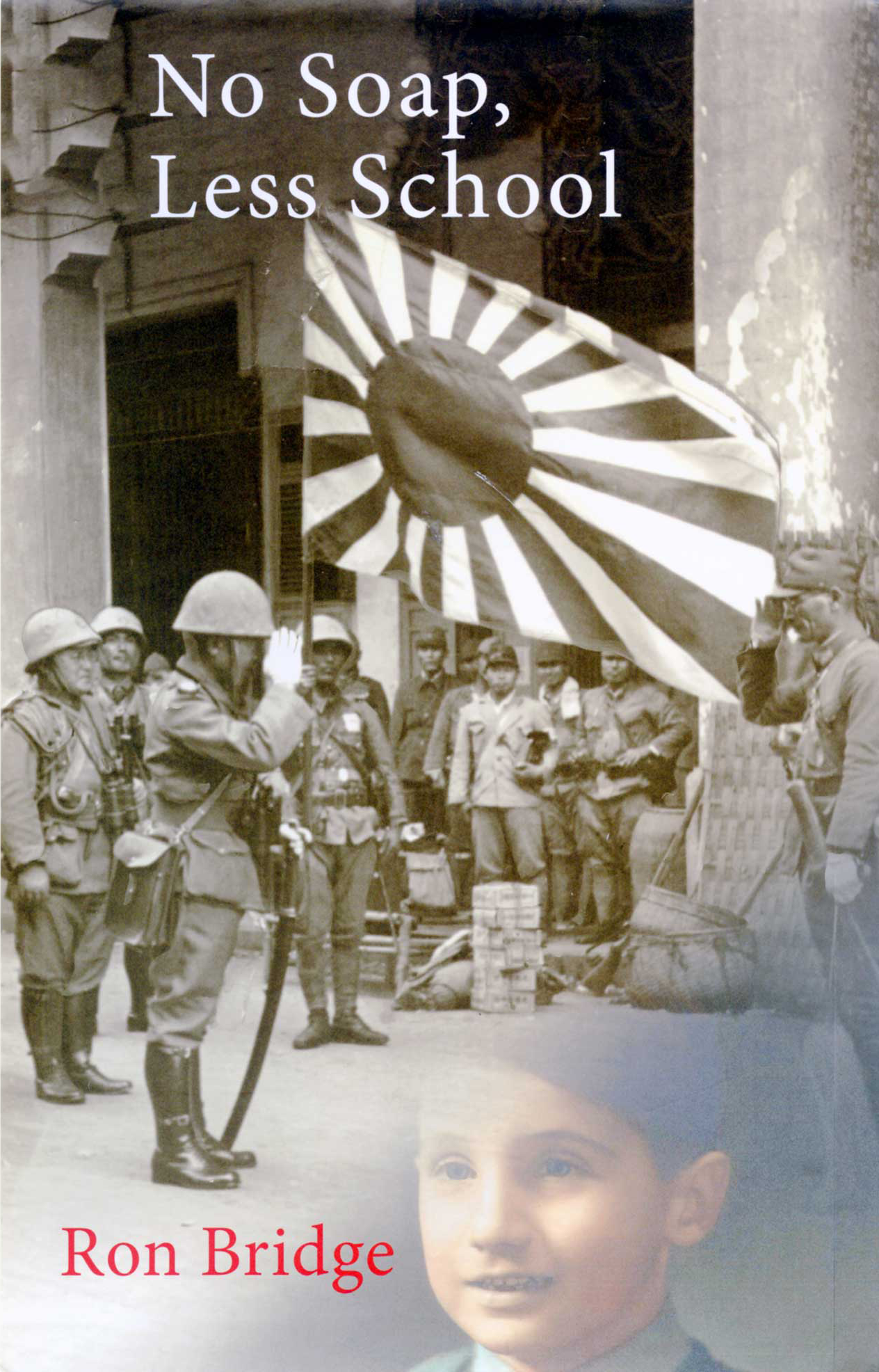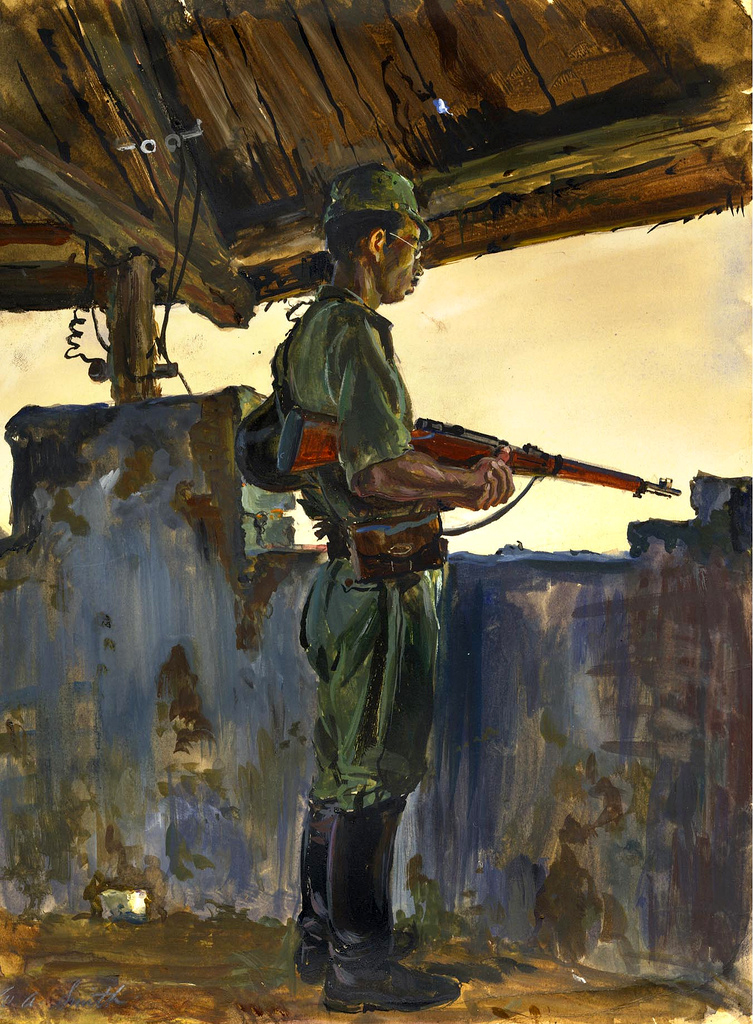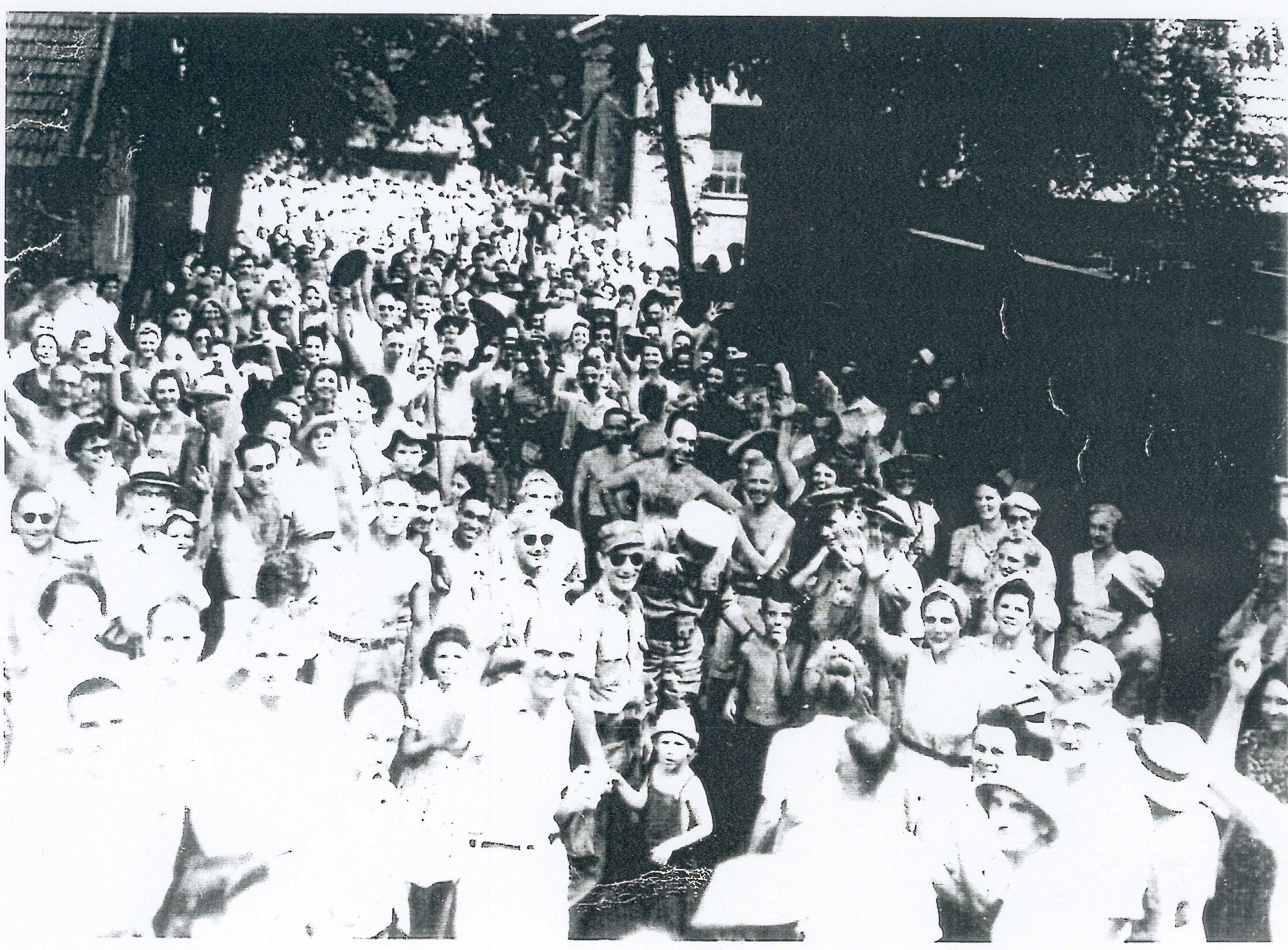
- by Ron Bridge
[Excerpts] ...
[...]
 Then we were told that we were being given new internee numbers to wear, and we had to collect new three-by-four-inch cloth name badges, to be on display at all times.
Then we were told that we were being given new internee numbers to wear, and we had to collect new three-by-four-inch cloth name badges, to be on display at all times.
The number consisted of one’s group number, a number up to fifteen, and an individual number to aid counting. We were lined up each morning in sequence in each group, although on occasions we had a `grand’ roll call on the sports field, when the group number became the row number.
I always eyed the watchtower with its machine gun that I had seen on my very first evening at Weihsien.
During roll call it was not unknown for us boys, having been counted once, to run behind the backs of the adults to be counted again, which when it occurred totally confused the guards and caused much scratching of heads. The adult internees did not take kindly to such antics because it often lengthened roll call to a couple of hours, and the guards took it out on the adults, slapping their faces, while I among the other boys got away scot-free.
[excerpt]
Towards the end of June, starting with all the medical staff, there was an outbreak of diarrhoea of epidemic proportions. At the same time, the weather broke and there was a day of heavy rain, a real downpour.
So many were sick that roll call took a couple of hours.
The next day the Japanese medical team arrived. The Japanese were paranoid about a cholera outbreak. So we were all lined up outside the hospital, everybody had a glass rod shoved up their behind; then after a test of the surface the glass rod it was wiped in alcohol and then shoved up the next candidate. There were at least five teams and the whole process took all day, although as originally planned the men were to be first, then the women and then those under fifteen. But the children under seven started bawling for their Mums and chaos reigned.
One certain thing you could say is that it was unpleasant while it lasted, and I got rather tired of looking at bare behinds. But probably not as unpleasant as when we got inoculations for whatever was the current threat of disease. As an example, shortly after the cholera scare, there was a big line-up for a typhoid inoculation, but one had to gauge one’s place in the queue carefully, as needles were in short supply.
The needle was changed about every 100 inoculations.
 [excerpt]
[excerpt]
I was rarely in our two rooms in Block 13 during the day. After breakfast and roll call, I was off somewhere in the camp running wild without supervision. Meals, however, were too important to miss and my friends, like me, ate in their own huts, so we all went back for lunch, our main meal and supper, usually some kind of soup and bread. I was not allowed out after supper except on the light summer evenings when there were semi-organised games on the sports field; otherwise I was taught various games of cards.
[excerpt]
The usual 9 a.m. roll call had been augmented by another at 7 p.m., the logic of which I could not understand. When Tipton and Hummel had made their escape, their subsequent absence had been obvious during morning roll call, and anybody else escaping would surely follow their lead and do so at night, not during the day: so the morning roll call should have been enough. Somehow, the evening roll calls always took longer.
On 16th August, at the 7 p.m. roll call, boredom had again set in: not only did the number within each group have to tally, but then the guards had to add up the totals. Any doubt and the whole camp had to be re-counted.
[excerpt]
The electric wiring in the camp was looped about anything and ran at varying heights. It was particularly low in front of the hospital (Block 61).
To relieve the boredom of waiting during roll call, the Chefoo School students, mainly the twelve to sixteen-year-olds, used to jump up and touch the wires.
One day the current was obviously ‘on’, as someone got himself burnt, but another, Brian Thompson, being very tall, had reached up and just gripped the wire — he was instantly electrocuted. Dr Grice was called and then Dr Robinson (Kailan Mining) and Dr Howie (Chefoo), because they were further away; the three carried out artificial respiration for nearly three hours, but to no avail.
Brian’s funeral was the next day, but Brian’s parents, who were in the camp, ruled that it would be private, for Chefoo only, the first and only restriction placed on attendance at a funeral, but then the parents were missionaries.
[excerpt]
On 1st October, the guards moved the evening roll call, which was brought forward to start at 6.30 p.m. Then a new timetable was issued: 8.15 a.m. Breakfast; 9 a.m. Roll call; 1.15 p.m. Tiffin;6° 5.45 p.m. Supper.
[excerpt]
There was a big showdown outside Block-24, which now held adult women. On a cold wet morning, having been counted at roll call, the women immediately went back inside. King Kong saw them and ordered them to stand for half an hour in the wet. They retaliated by dancing and skipping. King Kong went apoplectic, jumped on to a little platform and addressed them in Chinese, saying that he had been greatly insulted; if we had been in India, the authorities would have hung them up by their thumbs.
He knew that they called him names, but they were lucky that he did not take one of them and shoot them as an example for causing a Japanese to lose face. King Kong then went into Mrs Buist’s block which was across the Rocky Road from ours, and ordered her to stand on parade for roll call. Mrs Buist, a Salvation Army officer, refused to leave her three children, the eldest of whom was six. King Kong called her an ‘addled egg’ in Chinese.
Next day King Kong took roll call again and ended with ‘OK, ladies thank you.’ He had decided to be polite and ignore insults. The previous day he had arrived at the roll call saying, ‘I’ll dig the old sows out of their beds if they are not already standing to be counted.’
However, in early December, a Japanese guard went up to Mrs Howard-Smith, a nurse, and slapped her face when she was not lining up to his satisfaction outside the hospital. Ted McClaren reported it to the Commandant. King Kong was livid and upset, and said that if he was reported again he, King Kong, would have to commit hara-kiri and it would be on McClaren’s conscience.
[excerpt]
On May 3rd Mr Sabarwal, an ‘Indian’ whose British passport had expired in 1923, and who had long been suspected of being a Japanese stool pigeon, announced to the Committee that Germany had surrendered, but the camp was not to be told. Dad came in with the news half an hour after the Committee meeting. It was being openly talked about by the evening.
Two days later the Peking Chronicle arrived with the same news. At 11 p.m. that night, two teenagers climbed the bell tower of Block 23 and started tolling the bell, which served as the Fire Alarm.
Sgt Bushinde got very drunk, whilst all the rest of the guards were rushing round like headless chickens. Then one of them started the siren at the gate, but no one knew what that meant, least of all the guards. King Kong decided that at 1 a.m. there was to be a roll call and told Ted McClaren, who had to agree. Then Sergeant Bushinde ruled that guards would drag inmates from their beds if necessary. With twenty minutes’ notice, we spent an hour in the dark and cold. When it was over Mum announced that, as we had a little millet bread back at the hut, she was going to open a tin of salmon for a late-night feast. The consensus of opinion, amongst the adults, was that it had all been a stupid incident, but I never did find out what Mr Cotterill and the former Miss Hills, both Assembly of God missionaries, thought of it all: they had been married less than twelve hours when kicked out of bed for a roll call.
[excerpt]
Roger was now only a couple of months off four years old, and he and his American friend Charley no longer stayed so close to home to play. Roger was now allowed to wander over part of the camp, but never to cross Main Road. ‘There were no cars so he ran no risks from vehicles except the honey cart, and that came only once a day, and was pushed by four men. He used to enjoy playing near the sports field, as he knew the way there.
That had been the scene of the Mauser pistol episode.
Furthermore, he had often to go there for roll calls. He and his friend Charley had a passion for anything that moved. They loved insects and creatures that were alive. His favourite trick was a plot to give Mum hysterics. He would trot into the hut in his much patched sun-suit, with shorts as bottoms and a bib front with straps. Mum had made several out of a pair of curtains. Then, just as Mum was getting him to sit down and eat, he would reach into his bib front and produce a live toad and put it on the table.
The result was always the same: Mum would skip out of the hut and shout, ‘Do something, somebody!’
[excerpt]
Mrs Lawless died of typhoid on 8th August, and as the graveyard was now full the burial the next day had to take place outside the walls, hence only a handful of people could attend. Watanabe was nowhere to be seen. He was tracked down and Ted McClaren tried to speak to him, but Watanabe just ran away, pursued by a few dozen inmates. They lost him when he fled through the front gates, knowing that the internees could not follow there. Watanabe was unpopular with the prisoners, but if he were behaving like that then surely there must be something to hide. What was it? Speculation grew wilder and wilder. I kept remembering Grandpa’s predictions and wondered if we would all be killed before we could be freed from the camp.
On 14th August we had a special roll call on the sports field, and I eyed the machine guns in the towers. They traversed over our heads but nothing fired.
The next day there were more rumours that the Emperor of Japan had made a proclamation. Mum heard from Mrs Grice that Dr Vio had told her husband that the Emperor had given a broadcast, ‘For the first time in 2,600 years Japan had to seek peace from four countries.’ Was it really true? Nobody knew. The guards were conspicuous by their absence, but the answer was not long in coming.



[ picture above ] — Roger (as mentioned in the text) is the little boy of four, holding Father Hanquet’s hand in the foreground and approximately in the middle of the picture ...
http://weihsien-paintings.org/books/NoSoapLessSchool/book(pages)WEB.pdf
#








